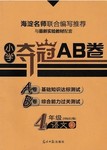题目内容
动词填空
阅读下面短文,用括号内所给动词的适当形式填空 (必要时可加情 态动词或助动词)。
That cold February afternoon, I was walking back to my home-stay, feeling a bit sad. I had studied English at the language school for 3 months. Now it 1.________ (be) all over. The time for me to say goodbye to my hostess(女房东) was coming.
“How was your day, Kim?” My hostess 2.________ (greet) me as I opened the door. “Not too bad.” I answered.
She 3.________ (prepare) supper for me in the kitchen. “I am coming to help you.” I said to her — she had some trouble4.________ (walk) because she had her foot hurt the other day.
“No help 5.________ (need) now. Just 6.________ (have) a rest. Supper is soon ready.” I helped her 7.________ (take) the dishes to the dining room and set the knife and fork on the table.
“Well, Kim, this is the last supper together. It has been nice to have you in my family. You have been so kind and helpful.”
“Miss Foster,” I said with tears in my eyes. “Thank you so much for looking after me so well. I 8.________ (not forget) what you have done for me. “It’s nice of you to say so. I think we can talk on the phone or chat on the Internet if we 9.________ (miss)each other. Well, It’s a pity I can’t see you off at the airport. But I 10.________ (call) a taxi for you already. It will come to pick you up at 7 o’clock tomorrow morning. The taxi will be paid by the school. So enjoy a good dinner and have a good sleep. You’ll see your family when you get up tomorrow.”
1.was
2.greeted
3.was preparing
4.walking
5.is needed
6.have
7.(to) take
8.will not/won’t forget
9.miss
10.have called
【解析】
试题分析:
这篇短文主要描述了作者和女房东最后一顿饭。从中我们可以知道女房东是个很善良的人,在作者居住期间给了作者很大帮助,彼此成为了很好地朋友。
1.句意:现在已经全部结束了.结合语境可知本句描述的是过去的状态,故用一般过去时态.主语it是单数第三人称,故谓语动词用is的过去式,填was.
2.联系上下文,可知本句描述的是过去的动作,故用一般过去时态,填:greeted,打招呼.
3.联系下文,可知她那个时侯正在为我准备晚饭.描述过去某时正在进行的动作用过去进行时态,主语she,是单数第三人称,故谓语动词用is的过去式was,填:was preparing,正在准备.
4.联系前文可知考察句式have trouble doing sth做某事有困难,结合所给单词,可知填动名词walking,步行.
5.联系下文可知句意:现在不要帮助了.结合语境可知本句描述的事客观状态,故用一般现在时态,主语为动作对象,用被动语态.主语为抽象名词,不可数,故系动词用单数.故填:is needed
6.联系下文及所给单词,可知考察短语have a rest,休息一下.祈使句中一般动词原形,故填:have,从事.
7.考察不定式做补足语.help后做宾语补足语的不定式,可以带to也可以不带to,故填:(to) take
8.句意:我不会忘了你为我做的一切.结合语境可知本句描述的是将来发生的动作,故用一般将来时态否定形式.填:will not/won’t forget
9.联系前文,可知条件状语从句的含义是,如果我们想念彼此了.当主句描述将来的动作时,条件状语从句用一般现在时态描述将来的动作,本句主语是we,复数形式,故谓语动词用原形,填:miss,想念.
10.联系下文,可知句意为:但是我已经为你叫了出租车.结合语境及副词already可知本句描述的是现在已经完成的动作,故用现在完成时态,主语I是单数第一人称,故助动词用have,填:have called
考点:短文中动词的运用能力
点评:由于本题已经给出所需单词,故完成比较简单。解答此类题型的方法一般就是根据上下文及时间状语,主语的人称与数,判断出动词的时态和数的变化,然后进行适当的词形变换,完成阅读。注意在叙事性短文中,谓语动词多为一般过去时态及现在完成时态,说明性短文中谓语动词多为一般现在时态。

 小学夺冠AB卷系列答案
小学夺冠AB卷系列答案